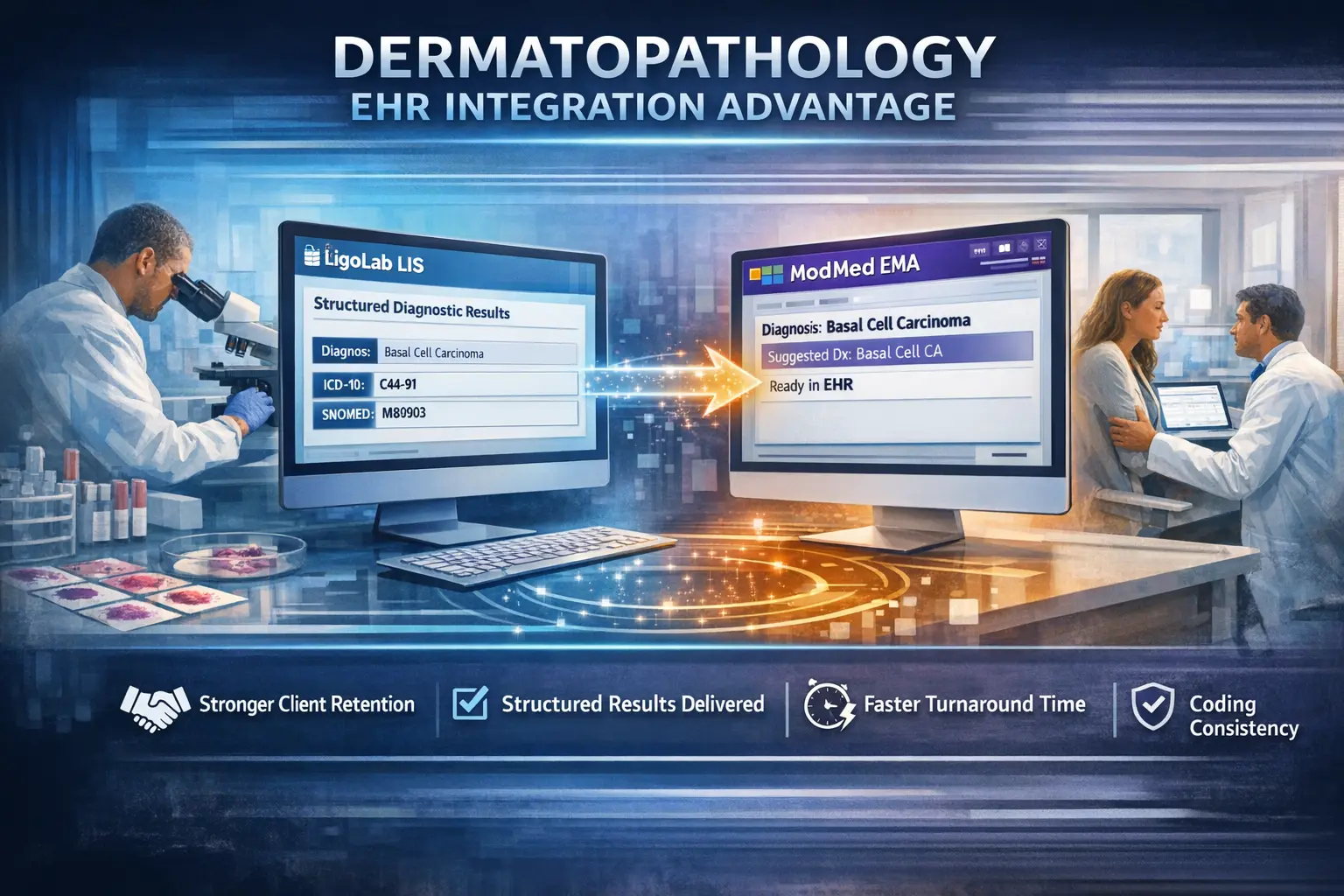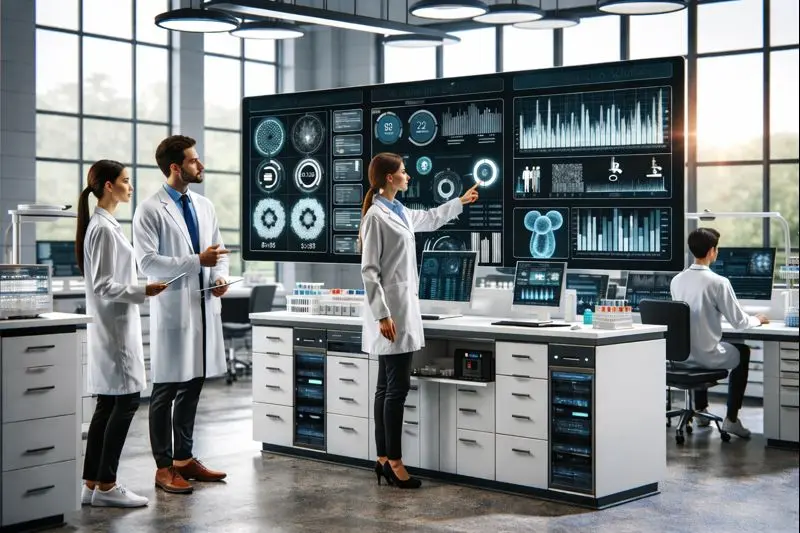Blog
Pathology Lab Management Software
August 27, 2025
Every anatomic pathology practice and clinical laboratory relies on an effective pathology lab management system to operate successfully. Two essentials are at the core of any lab business: sample tracking and patient/data management. When these processes are handled manually, specimen tracking and laboratory workflow management become time-consuming, error-prone, and risky, ultimately threatening both efficiency and patient safety.
To overcome these challenges, forward-thinking labs are adopting modern laboratory information systems (LIS software). That’s because today’s pathology LIS systems go beyond basic record-keeping, incorporating rules-based automation, advanced modules, and intelligent engines that streamline operations, reduce errors, and enable seamless, scalable, and innovative clinical lab workflow.
Let’s explore and discuss how these modern medical LIS lab solutions contribute to efficient and optimized laboratory workflow management.
Discover More: Leveraging LigoLab for Optimal Return on Investment - An LIS System Guide for Lab Directors

The Importance of Clinical Laboratory Management Software
Just as electronic health record (EHR) systems have become central to hospitals and clinics, advanced clinical laboratory management software remains key to running an efficient and profitable lab business.
Directors and managers typically have access to two types of laboratory software systems, but only one is purpose-built for comprehensive clinical laboratory management.
Traditional laboratory information system software centers on patient care by managing test results and patient data. However, the best LIS software platforms are developed by forward-thinking laboratory information system vendors and designed to be highly customizable and interoperable, ensuring seamless connectivity with other laboratory software systems.
Case Study: How to Triple Productivity & Boost Net Collections by 35% with LigoLab Informatics Platform
On the other hand, laboratory information management system (LIMS) software is primarily designed for batch sample management in non-medical settings such as chemical, environmental, and food and beverage laboratories.
While the terms LIS and LIMS have often been used interchangeably within the medical lab industry, that distinction is becoming clearer. This stems from modern LIS systems that are evolving rapidly, with laboratory information system functions increasingly tailored to the specific needs of medical laboratories.
What is Clinical Laboratory Management Software?
Laboratory software systems, such as the LigoLab LIS & RCM Laboratory Informatics Platform, are examples of laboratory information systems used for clinical laboratory management to improve a lab’s productivity.
A modern laboratory information system functions as more than just diagnostic lab software; it acts as a team member, manager, and administrator all in one. An advanced medical LIS automates workflow management and provides complete oversight of laboratory operations, ensuring instruments and analyzers run smoothly. Additionally, by expertly tracking specimens and standardizing protocols, a modern LIS lab solution boosts efficiency, controls costs, and minimizes the risk of human error.
LIS software vendors note that the best LIS software can be optimized for each testing organization to support that lab’s unique needs, even as basic laboratory information system functions center on tracking patient data, samples, and test results.
With the help of this powerful type of clinical laboratory management software, laboratories can adhere to quality standards and be compliant with regulatory requirements. By selecting the best laboratory information system for their needs, they can maximize the efficiency of all laboratory processes and effectively (and optimally) allocate their staff and resources to benefit the business.
On-Demand Webinar: How Standardization and Enhanced Reporting Capabilities Improve Lab Workflow and Overall Business Operations
The Benefits of Modern LIS Laboratory Information System Software
Every medical laboratory has unique requirements, which means the best laboratory information system software must be highly adaptable. For instance, anatomic pathology LIS platforms (anatomic pathology software) integrate with instruments in very different ways compared to molecular LIS solutions (molecular lab testing software). The best LIS software can therefore be fully customized to align with the specific workflows of each laboratory.
While every LIS healthcare solution shares a core set of capabilities, let’s next list essential features of these systems with examples of how they support laboratory operations.
Help with Specimen Tracking and Management
One of the key functions of all modern LIS systems is the effective management and tracking of the samples passing through the lab. This includes protocols for safekeeping, proper handling, data quality, and a proper chain of testing procedures. It also manages shipping and transport, tracks inventory locations, and maintains a record of prior testing procedures and results.
Laboratory Workflow Management of Instruments and Inventory
The best LIS software continuously monitors a laboratory’s instruments, work schedules, and maintenance needs. This includes tracking storage capacity, providing usage instructions, and issuing alerts for potential instrument malfunctions (before they disrupt operations).
Help with Laboratory and Team Management
Modern LIS systems also support effective workforce and resource management. They streamline timelines, sample queues, and procedures, enabling lab directors and managers to allocate people, equipment, and resources more productively. The result is an optimized workflow that maximizes both efficiency and accuracy.
Pathology Lab Reporting Software and Data Analysis
Instead of relying on separate pathology lab software, advanced medical LIS systems handle both data analysis and results reporting. Information extracted from samples can be compiled, audited, shared, and analyzed seamlessly within the medical LIS, ensuring accuracy, compliance, and clear communication across the lab ecosystem.
Compliance with Regulations and Protocols
Strict procedures are required when working with samples, reagents, and pathogens for storage, handling, and conduct. Advanced LIS systems can automate these processes to ensure compliance with regulations. These LIS software solutions streamline routine quality control checks and simplify reporting to regulatory agencies.
Secure Data Storage and Easy Sharing
The best laboratory information system software safeguards confidential patient data with robust security measures. Advanced LIS pathology platforms often utilize cloud-based storage, ensuring that all information and databases are securely protected, regularly backed up, and easily retrievable. By maintaining digital records in the cloud, labs can also streamline communication and share results seamlessly with hospitals, partner laboratories, clients, and other institutions.
Laboratory Billing and Lab Revenue Cycle Management
Advanced laboratory information systems, such as LigoLab’s all-in-one medical LIS with embedded billing software for labs, underline the importance of laboratory billing/lab revenue cycle management features in the LIS system’s infrastructure. While separate medical laboratory billing software is an option, an all-in-one medical LIS and laboratory revenue cycle management solution allows for automated lab billing with much fewer denials, secure transactions, timely payments, and much better overall revenue capture.
The best LIS software unifies patient demographics, lab orders, insurance details, and financial data within a single workflow, minimizing claim denials, streamlining processing, and reducing time spent on collections.
White Paper: Maximizing Your Lab’s Profitability - The Case for In-House Lab Billing

Other Uses for Clinical Laboratory Management Software
Modern laboratory information system solutions can be implemented in various lab environments to centralize all processes and create efficiency that leads to scalability. The basic functionalities are the same; however, each type is customized for specific needs.
Regardless of the lab environment, advanced LIS systems ensure all steps and requirements are taken and protocols followed. That list can include the following.
- Time management
- Cost management
- Preparation, storage, and processing of samples
- Data collection and storage of information
- Compliance with standard operating procedures
The best laboratory information system software saves time and resources while standardizing clinical lab workflow, which is critical for all types of diagnostic testing.
Discover More: Stability and Performance - The Two Most Important Aspects of a Modern Laboratory Operation

The Last Word on Advanced Laboratory Information Systems
Modern LIS systems are the most important pathology management software. They enable lab staff to conduct and manage laboratory work by coordinating sample handling, sample tracking, procedural standardization, data storage, team and resource management, and laboratory billing.
Modern LIS software has the power to transform an entire lab. It’s one of the most valued “team members” in a laboratory, regardless of whether it’s customized anatomic pathology LIS software, molecular LIS software, or a broader LIS system for other clinical lab workflows.
See why leading labs trust LigoLab’s advanced LIS system solutions to improve accuracy, efficiency, and profitability.







